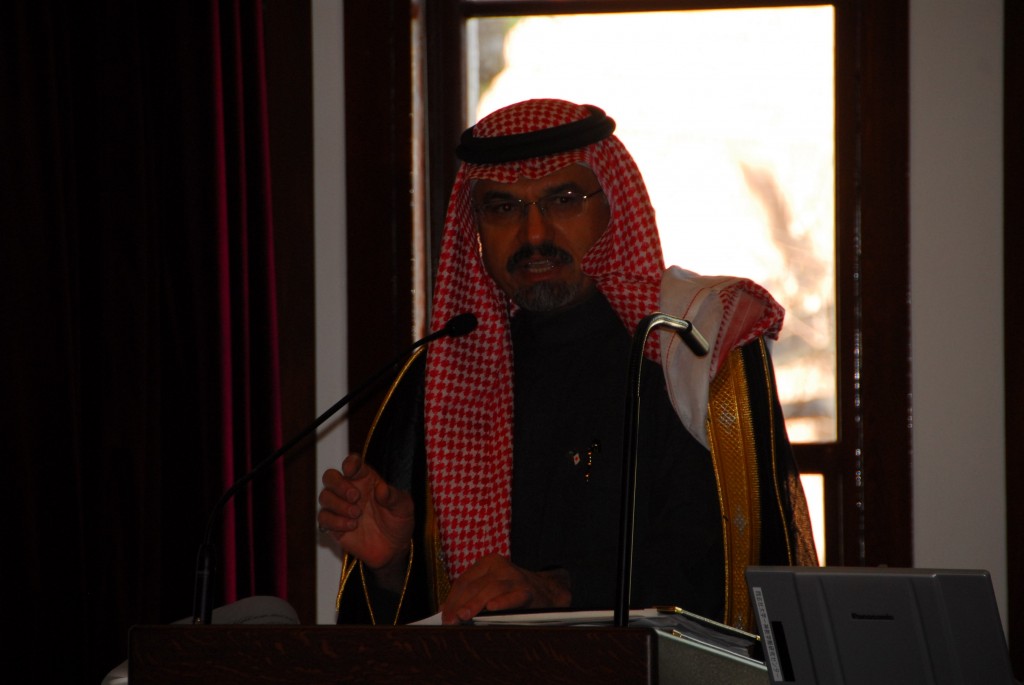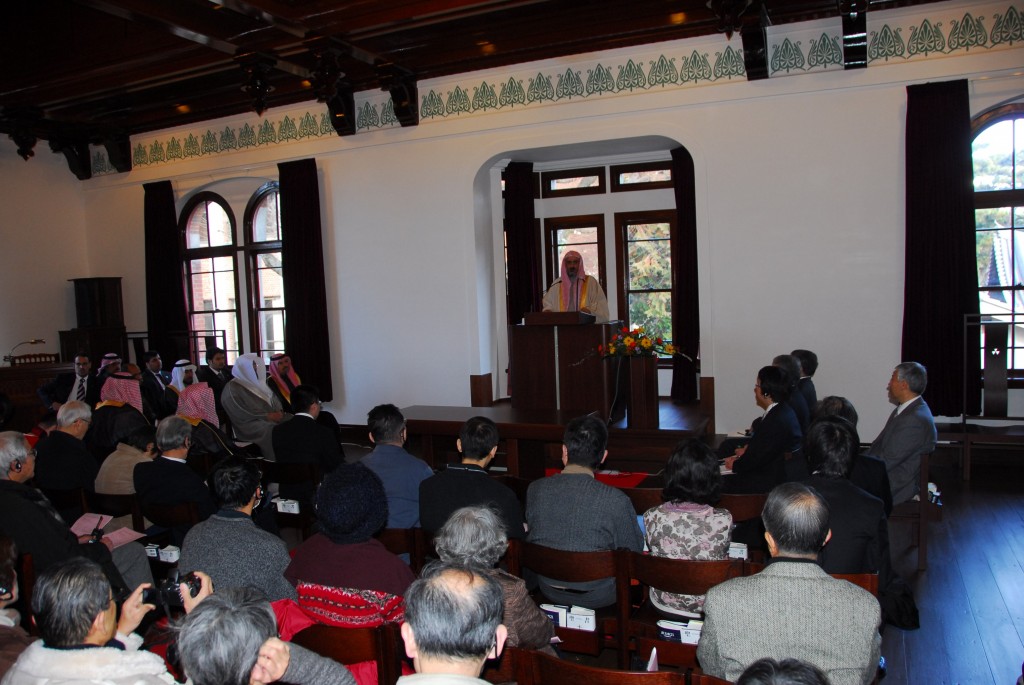Center for Interdisciplinary Study of Monotheistic Religions(CISMOR)Doshisha University
> Public Lectures > International Symposium “Dialogue in Islam: Issue of Dialogue Adopted by Muslims and Future of Dialogue Efforts”Public Lectures
International Symposium “Dialogue in Islam: Issue of Dialogue Adopted by Muslims and Future of Dialogue Efforts”
| Date: |
2009/01/24 10:00-18:00 |
|---|---|
| Place: | Clark Chapel, Clark Memorial Hall, Neesima Kaikan |
| Lecture: |
Muhammed Al-Zeer, and 5 other speakersMuhammed Al-Zeer, and 5 other speakers |
| Summary: | |
|
The international symposium began with opening addresses by Dr. Yasuhiro Kuroki, Vice President of Doshisha University, and Dr. Sulaman Abdullah Abalkhail, President of Al-Imam Mohammad Ibn Saud Islamic University in Saudi Arabia. Both remarked that this symposium marks a starting point for fruitful dialogue between Japan and Saudi Arabia in the future. Dr. Abdukareem Hamad Al-Sayegh pointed out that the Islamic teachings at the core of the people of Saudi Arabia and the spirit of the samurai behind the Japanese identity share many common values, such as tolerance, harmony, brotherhood, and the spirit of dedication. According to him, the “culture of dialogue” that was established in Saudi Arabia by the present King Abdullah has taken root among individuals and groups, and many organizations were established for the purpose of promoting dialogue. As a representative of such organizations, the Center for Islamic Contemporary Studies and Dialogue of Civilizations has launched various activities to spread the spirit of dialogue and coexistence. Dr. Mohammed Alzeer detailed the effort of King Abdullah for inter-civilization dialogue, and introduced basic conditions of the dialogue presented by the King as follows. (1) The important thing is to ask God to give heed to the crises that face humanity and save us from such crises. (2) We should hold open conference to people of all religions. (3) We should promote the importance of human equality, value, and morals. (4) Dialogue based on intelligence and wisdom is the best way. (5) We should take up the challenge imposed by radical thought. (6) We should take up the challenge imposed by ignorance and incorrect thought. (7) We should share values trustfully and confidently. (8) We should call for dialogue as a message from an Islamic nation. (9) We should not fight for the reason of difference. (10) We should stand up against damage caused by loss of value and misunderstanding. (11)We should recognize that dialogue is a common process for solving problems. While mentioning these basic conditions, he gave an account of organizations founded by King Abdullah, conferences the King attended, and statements the King made at the conferences. Professor Koichi Mori began his remarks by emphasizing that the Doshisha School of Theology and CISMOR are distinguishable from other research institutions in the world in that their research area is not confined to Christian theology, but covers other two monotheistic religions, namely Islam and Judaism. Then, he briefed the activities that CISMOR had undertaken to promote inter-religion dialogue. Doshisha University boasts a superior environment for inter-religion dialogue because here, researchers of the three monotheistic religions work together in the same space and are constantly given opportunities to engage in dialogue with each other. In addition, Kyoto, where Doshisha University is located, has the largest concentration of religions in Japan, and this enables the researchers to have dialogue with Buddhist priests in a positive and continuous manner. The significance and merit of conducting such monotheistic research in Japan are twofold. First is domestic contribution—the research can provide Japanese society with accurate information about monotheistic religions, which has not been sufficiently available. Second is international contribution—Japan has not been directly involved in historical conflicts and antagonisms among monotheistic nations and thus can conduct unbiased research on this issue and offer a venue for dialogue between researchers of the three monotheistic religions. Inter-religion dialogue should not be held with a congenial “Let’s be friends” style. Instead, the dialogue should enable us to recognize mutual differences and identify what factors in our religious traditions present obstacles to dialogue, and how such factors should be changed if we are to realize dialogue and coexistence. Professor Mori emphasized the importance of these points in inter-religion dialogue. Showing photographs, Professor Samir Nouh presented his view on the development of reformed thought in the Arabic Peninsula from a Japanese perspective. Historically, the kings of Saudi Arabia ruled the country based on the thought of Muhammad ibn Abd al-Wahhab, but the term “Wahhabism” is viewed as synonymous with sin and flaw in the Western world. Now is the time to correct this understanding. He pointed out that the roles played by religions during the Edo period in Japan and the role of the Wahhabist thought had several things in common. For example, Tokugawa Ieyasu attempted to establish a religious foundation of the nation by deifying himself, and similarly, Muhammad ibn Saud obtained religious legitimacy by protecting Wahhab. Furthermore, Shinto’s pilgrimage to Ise can be compared to Islam’s pilgrimage to Mecca, and purification at a Shinto shrine can be compared to purification by Muslims before prayer. Additionally, he argued that, just as the religious reform and restoration movement that took place during the last days of the Edo period led Japan to the Meiji Restoration, Wahhab’s movement led to the establishment of Saudi Arabia. Tawheed, or the concept that there is none worthy of worship except Allah, emphasized by Wahhab, played an important role in the unification of the Arabic Peninsula, and in a similar way, Buddhism and Shinto worked together to unify Japanese people spiritually during the Meiji Restoration. The thought of Wahhab is embraced by leaders of the Kingdom of Saudi Arabia even today, and this has led to the Islam Reform Movement. If we are to have a correct picture of Islam today, the thought of Wahhab and its significance should be rightly understood. In concluding the remark, he emphasized that in Islam, God’s mercy is directed not only at Muslims but at all the people in the world, and it is in that spirit that King Abdullah calls for dialogue and tolerance the world over. Ryuji Fujimoto (Research Fellow, CISMOR, Doshisha University) |
|
|
January 24 (Sat.) 10:00 am - 12:15 pm Session 1 Opening Words Yasuhiro Kuroki (Vice President, Doshisha University) Sulaman Abdullah Abalkhail (President, Al-Imam Mohammad Ibn Saud Islamic University) Chair Katsuhiro Kohara (Professor, School of Theology, Doshisha University) Presentation 1.1 Abdukareem Hamad Al-Sayegh (Dean, Center for Islamic Contemporary Studies and Dialogue of Civilizations) 1.2 Mohammed Alzeer (President, Arabic Islami Institute, Al-Imam University, Tokyo) 1.3 Koichi Mori (Professor, School of Theology, Doshisha University) 1.4 Samir Nouh (Professor, Office for Advanced Research and Education, Doshisha University) 3:00 pm - 6:00 pm Session 2 Chair Samir Nouh (Professor, Office for Advanced Research and Education, Doshisha University) Presentation 2.1 Katsuhiro Kohara (Professor, School of Theology, Doshisha University) 2.2 Muammer Junya Shinohe (Professor, School of Theology, Doshisha University) 2.3 Fahad Abdullahal Semmari (Secretary-General, King Abdulaziz Foundation For Research And Archives) 2.4 Abdukareem Hamad Al-Sayegh (Dean, Center for Islamic Contemporary Studies and Dialogue of Civilizations) |
|

